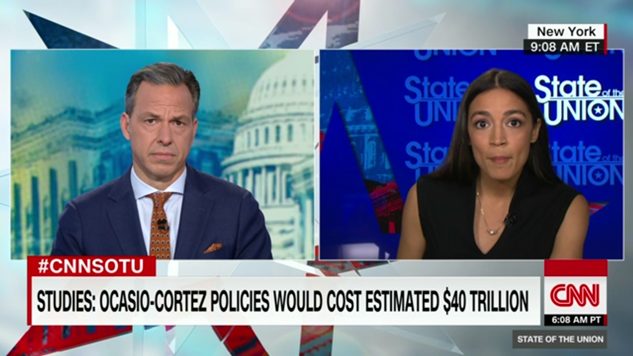As Usual, CNN and Jake Tapper Left Out Crucial Context in Their Attack on Medicare For All
Photo via screenshot
On Sunday, CNN’s Jake Tapper interviewed Alexandria Ocasio-Cortez in a clip that went viral—especially in the right-wing blogosphere. Doing his journalistic duty, he asked a high-profile politician how she planned to pay for her ambitious policies. Ocasio-Cortez gave a solid answer for those familiar with the wonkish aspects of policymaking, but for the layperson, it was confusing and came off as dodging the question. Here is the key part of the exchange:
TAPPER: Your platform has called for various new programs, including Medicare for all, housing as a federal right, a federal jobs guarantee, tuition-free public college, canceling all student loan debt.
According to nonpartisan and left-leaning studies friendly to your cause, including the Center on Budget and Policy Priorities or the Tax Policy Center, the overall price tag is more than $40 trillion in the next decade.
You recently said in an interview that increasing taxes on the very wealthy, plus an increased corporate tax rate, would make $2 trillion over the next 10 years.
So, where is the other $38 trillion going to come from?
OCASIO-CORTEZ: Well, one of the things that we need to realize when we look at something like Medicare for all, Medicare for all would save the American people a very large amount of money.
And what we see as well is that these systems are not just pie in the sky. They are — many of them are accomplished by every modern, civilized democracy in the Western world. The United — the United Kingdom has a form of single-payer health care, Canada, France, Germany.
What we need to realize is that these investments are better and they are good for our future. These are generational investments, so that not just — they’re not short-term Band-Aids, but they are really profound decisions about who we want to be as a nation and as — and how we want to act, as the wealthiest nation in the history of the world.
What Ocasio-Cortez is getting at is that government spending isn’t as simple as a family’s budget of money going in and money going out—as deficit financing (the act of using debt to pay for things) is a very common and relatively safe way for governments who control the money supply to pay for policies (I say “relatively safe” because the weaker your economy is, the less debt a government can take on, and obviously, we cannot just spend into infinity and keep printing money while expecting it to retain its value—but for a $19 trillion per year economy with the global reserve currency, we can afford a lot of deficit spending, as the last forty-plus years of American policy have proven).
Deficit financing is how the Republican Party pays for its tax cuts, and how America has largely paid for our wars in Afghanistan (cost of roughly $1 trillion) and Iraq ($1.1 trillion). It’s not an unreasonable answer, but the deficit scolds who have overtaken Washington refuse to accept it as any kind of response to how will you pay for liberal programs, and Tapper’s subsequent questioning echoed those deficit scolds by hammering away on a largely contextless figure.
But that is an issue of ideology. The bigger offense committed by CNN is a journalistic one, and it is in presenting the source of their $40 trillion figure as “nonpartisan and left-leaning studies friendly to your cause, including the Center on Budget and Policy Priorities or the Tax Policy Center.” Here is the graphic that Jake Tapper presented before questioning Ocasio-Cortez. The sourcing for all these figures is at the very bottom of the page, partially obscured by CNN’s bottom line.

You can see that they are indeed citing the Center on Budget and Policy Priorities and the Congressional Budget Office, but what Jake Tapper failed to include in his “nonpartisan and left-leaning studies” is the source right after “institute” (which I believe is the liberal-leaning Urban Institute): George Mason University. That’s where the game is given away, and the fact that at no point in the interview did Tapper bring up George Mason’s study is what calls into question the journalistic integrity of this segment.
That George Mason University citation is the bulk of the $40 trillion figure, as it is the source of the $32 trillion Medicare for All estimate, which comes from the partially Koch brothers-funded Mercatus Center at George Mason University. This is really just a continuation of an obfuscation that took place last month. Jake Tapper and the litany of fact-checkers across mainstream media derided a new talking point on the left that cited a study from the Mercatus Center which found that the Medicare for All plan submitted to the Senate by Bernie Sanders would save money over our current health care system. Here is the summary of that battle from my piece from last month:
The fact is that Charles Blahous [of the Mercatus Center] ran Bernie Sanders’ numbers and found that it would save us $2 trillion over the current system, and Charles Blahous says he doesn’t believe that Bernie’s numbers are realistic. What the “fact checks” are saying is that because Blahous doesn’t believe Sanders’ numbers, Sanders’ claim that his numbers were validated by a study partially funded by the Koch brothers is misleading. These fact-checkers are siding with Blahous despite the fact that Blahous’ facts are dependent upon Sanders’ facts.
The reason they side with Blahous is because, like Jake Tapper said, they’re not here to make any judgement on the viability of Medicare for All. They’re here to say whether or not Sanders’ claims are factual, per the terms of the debate (which the fact-checkers have set). WaPo explicitly stated that their fact checks “rely heavily on how a study’s author says the data should be presented.” The problem here is that not only are there legitimate questions around both the author’s and the employer’s credibility behind the study, but also that the study relied on numbers from a group of leftist policy wonks who should have at least as much credibility as anyone taking money from the Koch brothers. Confirming that people said words is not the same kind of fact as those words having truth behind them.
Again, for those in the back: Blahous scored Sanders’ plan and it said it would save us $2 trillion. What’s happening is because it’s a partially Koch-funded study using a report by the Sanders’ team, the authors of the study get the last word, per the “fact checks.”
The Mercatus Center at George Mason University landed on the same number for Medicare for All as the liberal Urban Institute, and the fact that an ideologically different source arrived at the same conclusion should enhance the credibility of that $32 trillion figure. We are projected to spend $34 trillion on health care under the current system, so the question as to how we will pay for Medicare for All is partially answered by that $2 trillion in savings.
So to answer Tapper’s question as to “where is the $38 trillion coming from?” Well, $32 trillion is not completely new spending—it’s mostly a reallocation of existing health care spending—plus another $2 trillion in Medicare for All savings (at least). That leaves $4 trillion completely unaccounted for, which spread over ten years is reasonable to finance with debt (that’s $400 billion per year, and to put that figure in context, the Pentagon said they found $125 billion in waste per year—we could also make up the bulk of that $4 trillion figure by ending the massive government handouts to defense contractors, oil companies, etc…).
Besides, the fact that literally no one has asked how we will pay for our new escalation in defense spending is a pretty good indication of what major media deems as objectionable government spending. This new spending bill just passed with nary a peep emanating from the deficit scolds, despite the fact that we were already projected to surpass a $1 trillion deficit next year.
Congress votes 93-7 to approve $607B military budget, a $17B increase, @ericawerner reports
This appears to be the biggest military budget outside height of the Iraq War
No votes: 6 conservatives (Paul, Toomey, Sasse, Lee, Flake, Perude), & Sen. Sandershttps://t.co/0gOTkZsMRt
— Jeff Stein (@JStein_WaPo) September 19, 2018
Ocasio-Cortez should have emphasized that much of the spending on Medicare for All would be a reallocation of existing spending. Introducing something like an employer-side payroll tax equal to the amount we currently contribute to private insurance pays for a huge chunk of Medicare for All. State taxes that currently go towards Medicaid would also be shifted towards a federal single-payer program. Not to mention that administrative costs for Medicare are about 2%, while private healthcare spends around 12% to 18% on administrative costs. We have the most expensive health care system in the world, and there is plenty of fat to be trimmed in order to save money.
Again, Ocasio-Cortez erred in not pushing back against Tapper’s incorrect framing of the question which insinuated that this is all new spending. She should have pointed out that $34 trillion is already being paid into the health care system, and the vast majority of paying $32 trillion for Medicare for All is simply shifting existing payments from the private sector to the public sector. Jake Tapper wasn’t in the wrong to press her when she declined to give specifics. He was in the wrong, however, by framing the $40 trillion figure as based on nonpartisan outlets. The Mercatus Center is far from nonpartisan, and it makes up 80% of his big scary number.
If you’re still not convinced about how to pay for Medicare for All, think of it this way: if you get solar panels installed on your house, your new energy costs aren’t going to be the cost of solar power plus your existing energy costs. It’s going to be the cost of solar power minus whatever you were paying before. Medicare for All is designed to replace our current expensive and unsustainable private healthcare system. Parading around $32 trillion as some spooky contextless number is disingenuous and cuts against the grain of the Very Serious journalism that people like Tapper like to say they practice. Journalists should absolutely hold politician’s feet to the fire as to how they will pay for their policies, but calling your figures “nonpartisan” when you cite a significant chunk coming from a center backed by the Koch brothers is laughable—not to mention how deceptive it is to frame the $32 trillion Medicare for All price tag as completely brand new spending when it’s designed to replace the current $34 trillion health care system.
Jacob Weindling is a staff writer for Paste politics. Follow him on Twitter at @Jakeweindling.







































